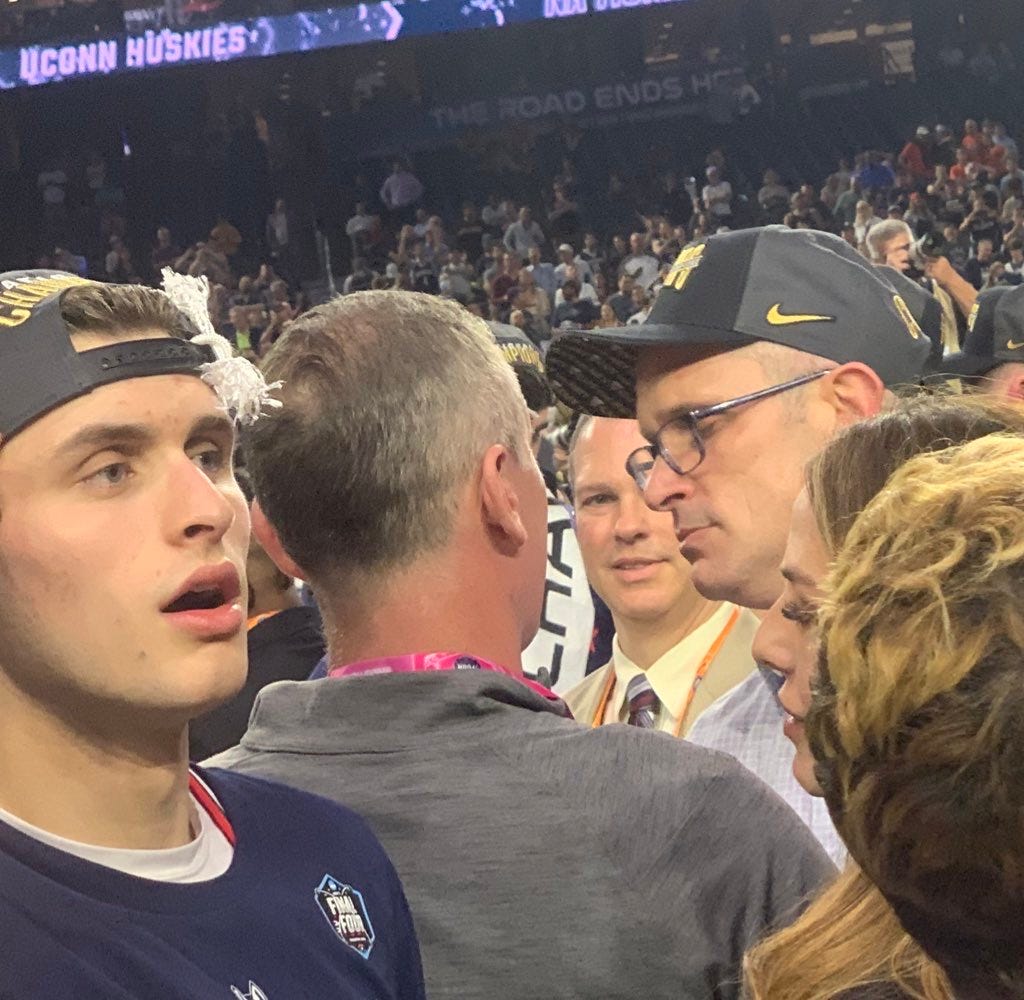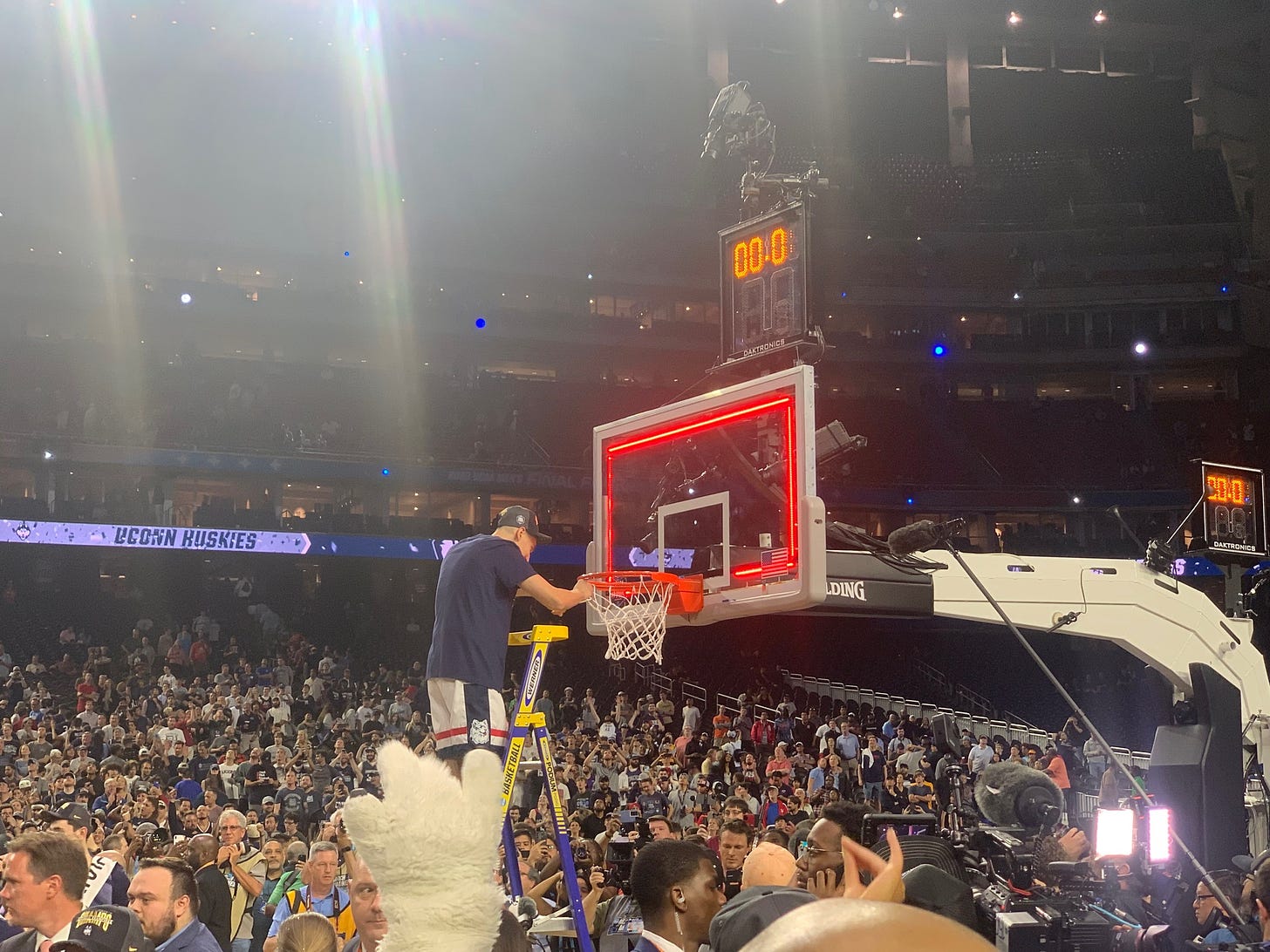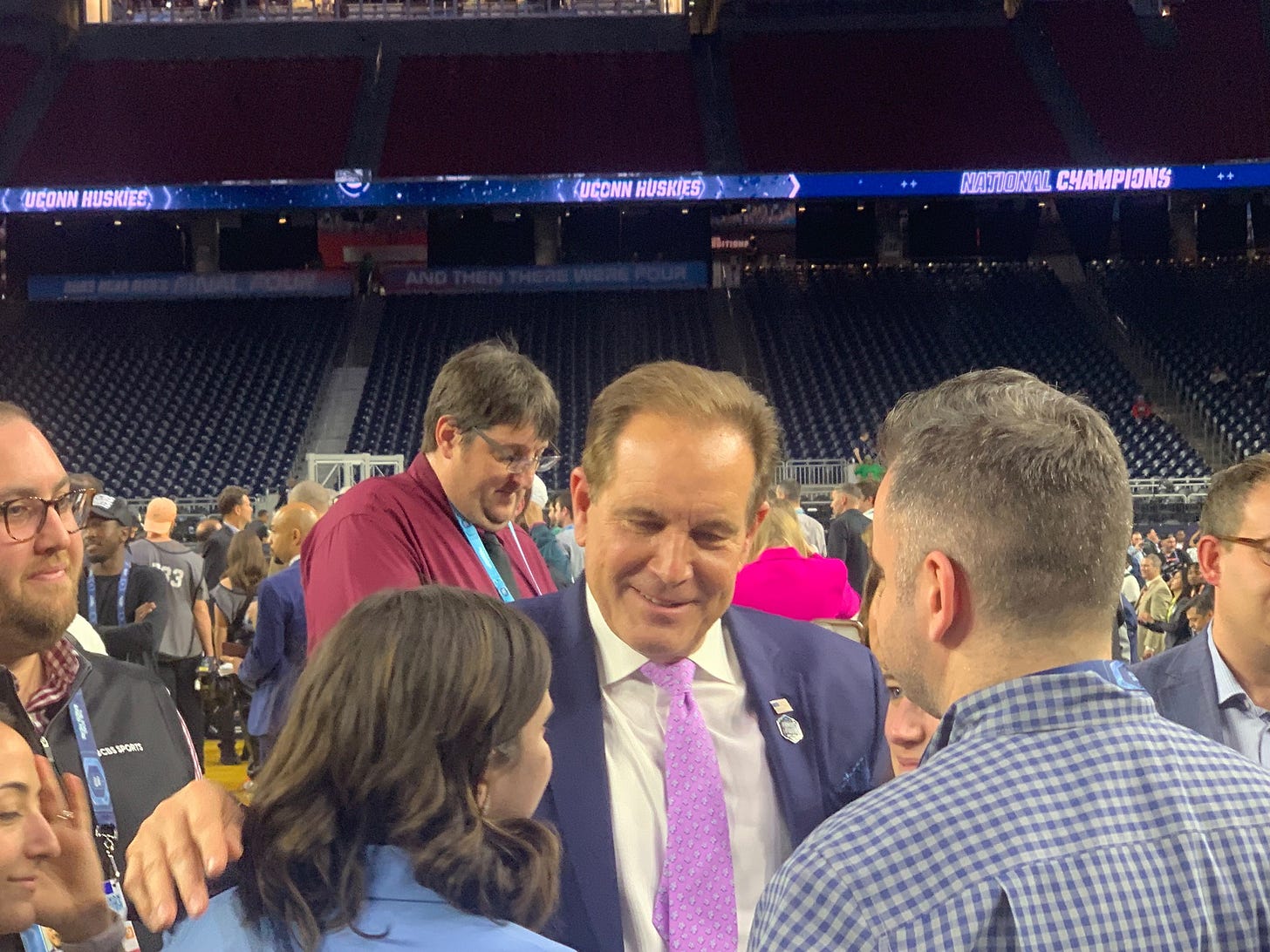Ball Is Life Is Family
A whirlwind few months of basketball culminated Monday night in Houston where, standing atop layer of confetti strewn about the NRG Stadium court and surrounded by throngs of media and administrators, Connecticut coach Dan Hurley and brother Bobby Hurley hugged.

Standing alongside them was Andrew Hurley, Dan’s son and a player on the 2023 national championship-winning UConn lineup. Andrew was the first member of the program to cut a piece of the net from the rim in celebration of the Huskies’ 76-59 defeat of San Diego State.
A scout-team player — the least glamorous of roles on a college basketball roster — Andrew Hurley had his One Shining Moment in the National Championship Game.
“Got in his sixth straight [NCAA] Tournament game!” said a beaming Bob Hurley Sr. of his grandson. Bob is the patriarch of the Hurley basketball dynasty, a legendary high school coach whose teams at St. Anthony’s in New Jersey are remembered still today with reverence.
“He got on the stat line, got a rebound,” Bob added, pumping his fist.
Scout-team members like Andrew don’t often play, let alone make statistical contributions. That’s especially true on a stage like the National Championship. Andrew’s rebound made this family affair all the more special.
In Bob’s wide smile and enthusiastic banter down on the floor, basketball’s importance to the Hurley family was beautifully encapsulated. But it isn’t the Hurley family’s joy alone.
The game runs through familial lines, passed through generations like an heirloom, at all different levels.
In Las Vegas at the West Regional, I spoke at some length with UConn’s Andre Jackson Jr. about his passion for the history of basketball. Jackson mentioned studying players from eras long before he was ever born, thanks to his dad.

Jackson’s experience reminded me of my own. I grew up watching Michael Jordan at his peak. I loved David Robinson. But my dad told me stories of when he was getting into the game and about the greatness of those who came before, from Bill Russell and Oscar Robertson, to the history-making all-Black starting five from Texas Western that won the 1966 national championship, to the ABA exploits of Dr. J and Connie Hawkins.
This inherited passion for basketball and its history also resonated for me this Final Four weekend with Jim Nantz calling his last National Championship Game.
Nantz made his debut as the voice of the Final Four in 1991, the first edition of college basketball’s premier showcase I remember watching. My family tuned in from our hotel in Tucson as an underdog Duke team — featuring point guard Bobby Hurley — stunned reigning national champion and undefeated UNLV.
From watching as a second-grader as Nantz called perhaps the biggest upset in Final Four history, to being on the same floor where the legendary broadcaster signed off, just how profound and long-lasting the love of basketball passed down through family has been in shaping my life struck me.
So, too, did Bob Hurley’s reminiscing of bringing up his boys on basketball.
“We had a couple little guys come into our gym in Jersey City when I was coaching David Rivers and these kids that played way ahead of them,” Hurley said of young Dan and Bobby. “And they wanted to play. They came into high school, they jumped into the assembly line and we were thrilled — honestly, thrilled — that they got they college paid for.”
Bobby, of course, won a pair of national championships as a player at Duke. He finished a career that arguably ranks among the top 100 all-time in college history.
Dan made less of an impact as a player at Seton Hall, but his imprint has undoubtedly been made on the game now as a coach. Bob’s pride discussing his sons’ coaching careers radiated even stronger than when he talked of their playing careers, and that reflected the hope of any father: To see his children grow into successful adults with positive impacts on their small parts of the world.
As a dad to three now, I couldn’t help but tear up a bit right there at NRG Stadium. I listened as Bob spoke of two young, skinny boys coming around the gym and thought about my boys, Liam and Jack.
Liam and Jack sometimes fight — that’s what brothers do. And Bob said that Bobby and Dan, separated by just 18 months, fought fiercely. But that’s only an expression of love, evident in the joy Bobby expressed for his brother on Monday.
A Jekyll and Hyde when contrasting his fiery demeanor coaching Arizona State, Bobby Hurley is calm and friendly off the sideline. I shook his hand and told him how great it was seeing him supporting his brother. He smiled ear-to-ear and responded just how proud he was of his younger sibling.
I aspire for similar love and support shown between my own boys.
My wife and I coached our older son, Liam’s National Junior Basketball team this season, part of the aforementioned whirlwind few months of basketball preceding the Final Four.
The youngest player on our team, Liam struggled at times. He played the game before, albeit in casual YMCA leagues. The NJB 76ers was his first taste of competitive basketball.
And, in our playoffs, he grabbed a long rebound in the final quarter; pivoted to the basket, dribbled into the paint and banked in a short jumper. He jumped up and down, pride emanating from him almost tangibly.
Then, when we gave up the next two scores and lost by one point, he sobbed.
Now, no parent enjoys seeing their child cry. But I was recounting this story to Coker University coach Jared Merrill in February. He said, “That’s good: It means he cares!”
Not everyone will care about the game in the same way, or achieve the same levels of success. I don’t expect either of my kids to become a top-100 all-time college player, or to coach a national championship-winning team.
But if they’re successful, and if they can pass down the familial joys of their childhood to their own children, they’re winners.





